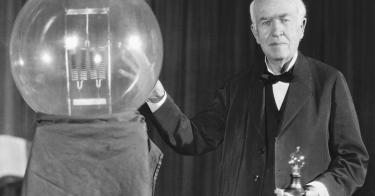The United States in 2023 feels a lot like the “malaise” of the latter years of Jimmy Carter’s presidency in the late 1970s. Amid persistent inflation and stagnating wages, Americans struggle to claw themselves out of the muck while the cost of everything from milk and eggs to cars and mortgages seems to bury them ever deeper, one shovelful of dirt at a time.
Perhaps it is no surprise that 81% of Americans say the American dream is either “not what it used to be” (66%) or “dead” as a doornail (14%), according to a recent survey commissioned by The Heritage Foundation. Only the lucky few say the American dream is “much stronger than ever before” (2%) or “a little stronger than it used to be” (4%), while some optimistic souls are willing to say it is “about the same as always” (13%). (The Daily Signal is the news outlet of The Heritage Foundation.)
Yet the Heritage Foundation survey also provides hope that Americans believe in reforms that can help unleash innovation and restore the dream they cherish. The survey, conducted online by Heart and Mind Strategies in May, polled 1,001 Americans in a nationally representative sample. Respondents expressed hope that innovators can bring back the American dream—if the government allows them to create wealth, not just in the form of money but in the form of convenience, fulfillment, and better living.
The American dream—often associated with a stable and fulfilling job, a loving family, and a white picket fence—revolves around personal financial freedom. Most Americans (81%) said “personal financial freedom,” defined as “the ability to make choices about how you will spend or save money, and decide when, where and how much you will work,” is either “extremely important” (38%) or “very important” (43%) to the American dream. Just 16% said this freedom is “somewhat important” to the dream, while only 3% said it is “not very important” or “not at all important.”
That freedom seems hard to attain in today’s United States. Most Americans (74%) rated themselves in the lower half of personal financial freedom, compared with all other Americans. They cited numerous barriers to achieving the American dream, including financial barriers such as the cost of living (70%), political polarization (58%), the decline of cultural values (50%), a lack of good jobs (47%), prejudice and discrimination (44%), crime (44%), and a poor education system (42%).
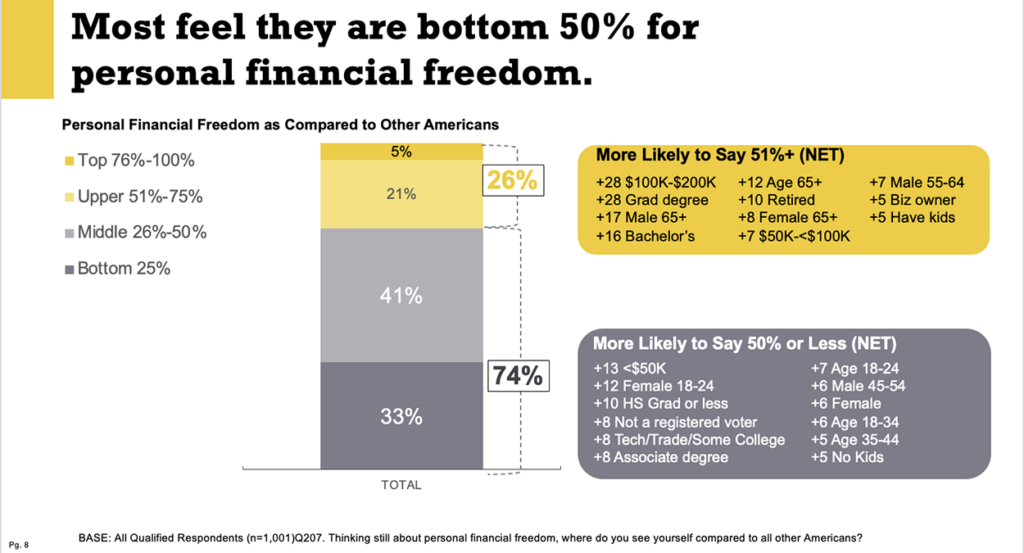
The term “capitalism” may not appeal to everyone, but most Americans trust the innovators who create new products or services. The vast majority (70% rounded down) of respondents said they have a “very favorable” (32%) or a “somewhat favorable” (39% rounded up) view of innovators, while most of the remainder (26%) said they have a “neutral” view.
When asked if innovators are more helpful or harmful to society, a whopping 88% of respondents said innovators are either “much more helpful to society” (31%) than harmful or “somewhat more helpful to society” (56%) than harmful, while only 12% said they are somewhat or much more harmful than helpful to society. While some remain skeptical about the potential for harmful inventions or wealth creators’ potentially greedy motivations, most remain optimistic about new ways to solve problems and make life easier.
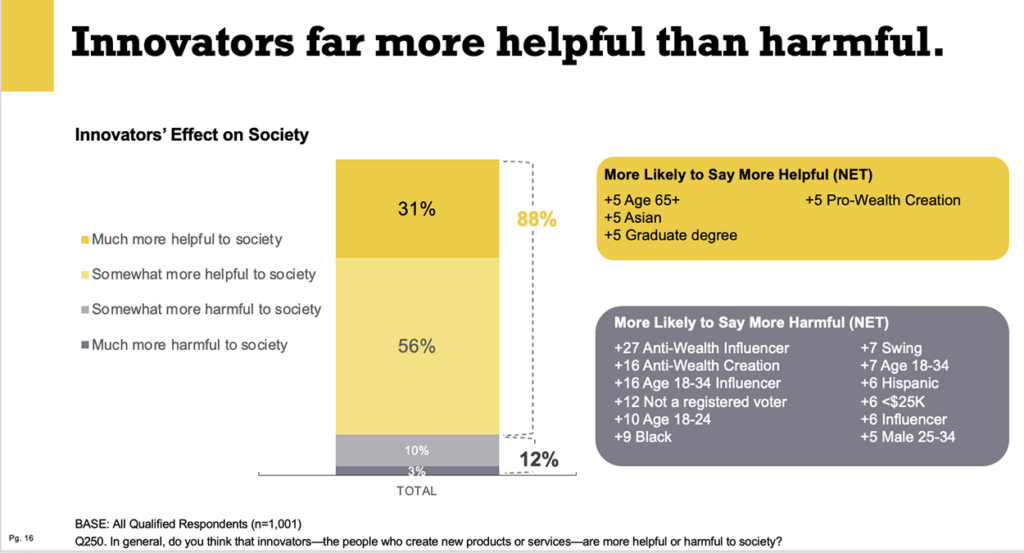
Innovation spurs the kind of wealth that everyone appreciates, even if it doesn’t translate to cold, hard cash. Faster transportation means more time to spend with family after work and school, and the ability to visit faraway places. Air conditioning and heating means more comfort in the summer and winter months. Refrigeration and microwaves allow Americans to keep food fresher longer and to cook meals more easily. These innovations don’t just make us richer—they enrich our lives in ways our ancestors could barely imagine.
Americans overwhelmingly celebrated the positive impact of the lightbulb (95%), the computer (94%), the internet (92%), smartphones (90%), the X-ray (87%), the airplane (81%), and the dishwasher (77%).
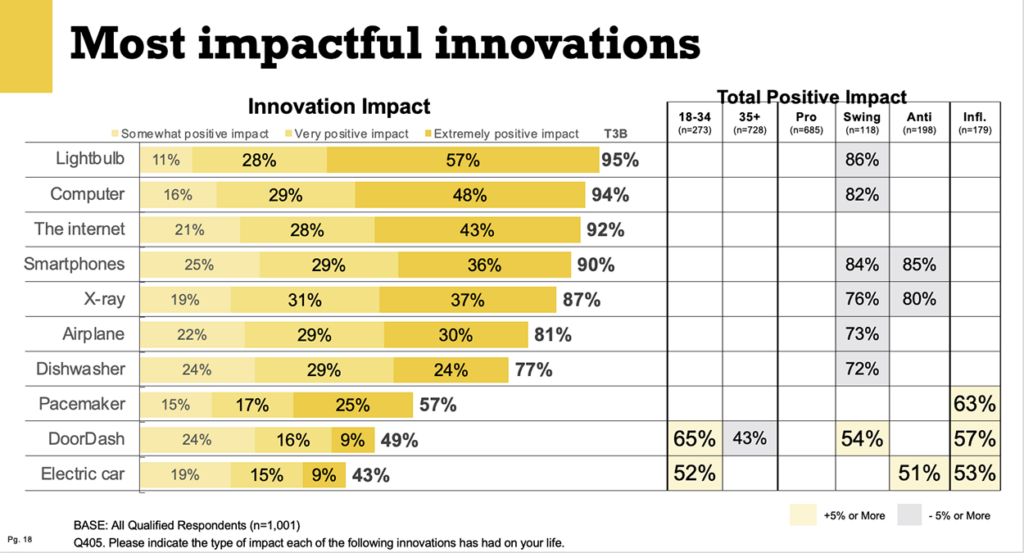
Entrepreneurs don’t just yield significant, life-changing innovations, however. They often launch companies that provide jobs and foster community. Americans trust small-business owners, agreeing (82%) that they “play an important role in fostering innovation by creating new products and services.”
More Americans see the government as the problem, not the solution, when it comes to innovation.
Nearly half of respondents (47% rounded up) said that the government either does “somewhat more to hinder innovation” (31%) or “much more to hinder innovation” (17% rounded down), while only 21% said it helps innovation. The remaining third (31%) said the government neither helps nor hinders innovation.
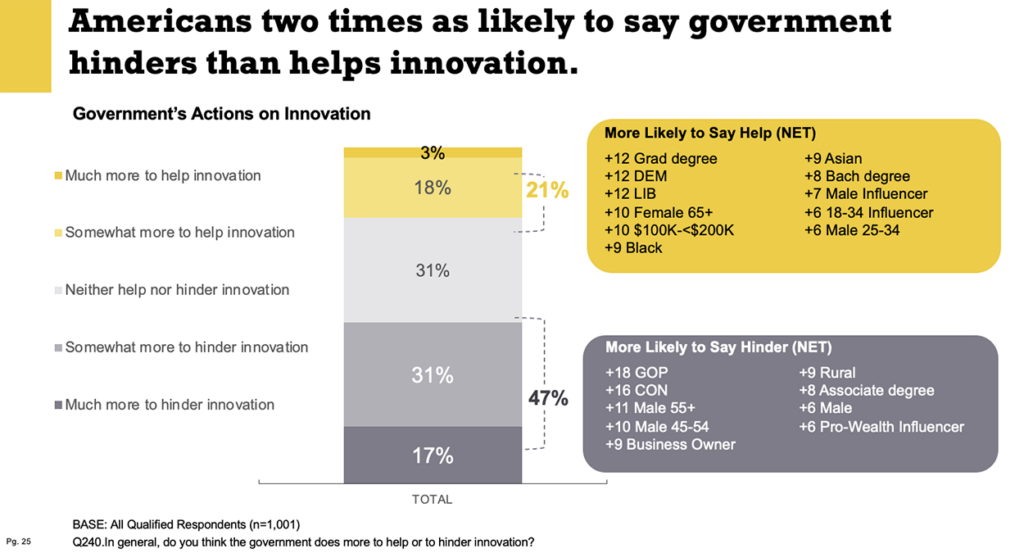
Very few Americans (13%) said they favor the government working “to ensure that innovators are highly taxed and strongly regulated,” while 30% said they’d prefer the government to “stay out of the way” and 47% said the government “should work to provide incentives and tax breaks to innovators.”
Most Americans support pro-innovation policies, such as allowing businesses to deduct more of their operating losses from taxable income (72%) and increasing “the amount of money that companies can deduct from their taxable income when they spend money on research and development” (66%).
Respondents also said successful innovators should pay “about the same tax rate” as the rest of Americans (71%), while only 22% said they should pay a higher rate. Even those who supported the higher rate were likely to underestimate the tax rates innovators currently pay, selecting tax rates similar to current levels.
While self-declared socialists such as Sen. Bernie Sanders, I-Vt., have demonized the wealthy, suggesting they did not earn their wealth or don’t pay their “fair share” in taxes, survey respondents said they support innovators enjoying the wealth they earn by contributing to society.
Most Americans (92%) agreed that “as long as successful innovators are paying all of their lawful tax obligations, they should be able to enjoy the benefits of their success.” They also agreed (85%) with the statement that “revolutionary new technologies are often sparked by the ideas and efforts of a few individuals. Their contributions to society are often incalculable. If they become financially successful as a result of that innovation, it’s a fair exchange for the benefit of society as a whole.”
Americans also agreed (83%) with the statement that “Innovators are risk-takers and experimenters. They fail a lot, and then sometimes succeed. The potential for big success is a big part of what motivates innovators to take big chances. Take away rewards for innovation and you take away innovation.”
As in the days of Carter, America’s current malaise traces back to profligate government spending and the Federal Reserve’s attempts to help the economy deal with the fallout. While the term “capitalism” comes in and out of fashion, Americans broadly favor unleashing the free market, allowing innovators to create the tools that improve our lives, and letting them enjoy the fruits of their own labor.
This piece is a part of The Heritage Foundation’s Wealth and Innovation project which stands to defend and promote the freedom to innovate, create and use wealth. These are essential to the delicate process by which innovators and entrepreneurs work to build a prosperous and purposeful society.
